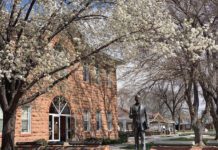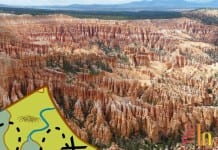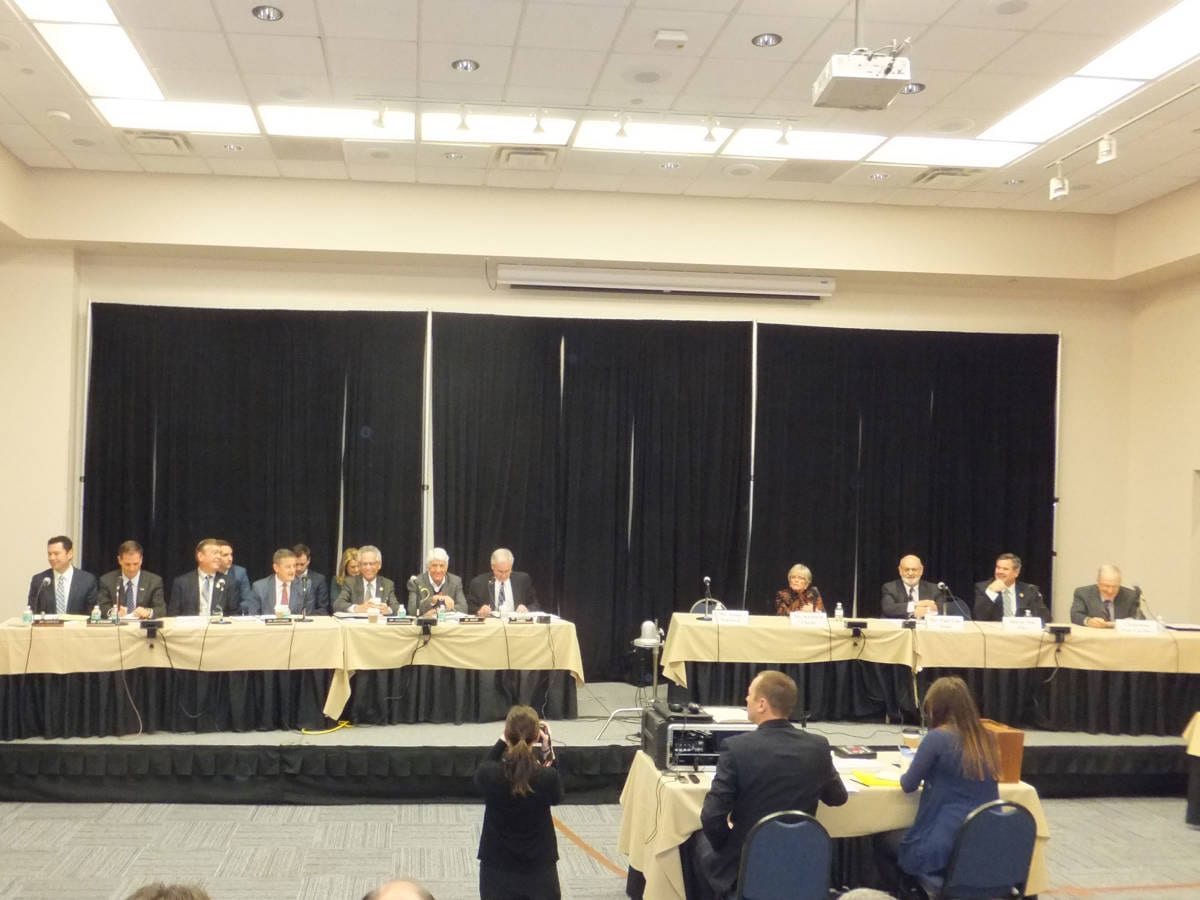
From left to right, Jason Chaffetz (R Utah), Chris Stewart (R Utah), Cresent Hardy (R Nevada), Bruce Westerman (R Arkansas), Alan Lowenthal (D California), Rob Bishop (R Utah), Chairman Tom McClintock (R California), Ms. Kathleen Clarke
Director State of Utah Public Lands Policy Coordinating Office, Mr. Paul Van Dam Former Executive Director, Citizens for Dixie’s Future and Former Attorney General, State of Utah, Mayor Jon Pike City of St. George, Utah, Chairman Alan Gardner
Washington County, Utah Commission
Not shown, Ms. Jenna Whitlock, Acting State Director, Utah State Office Bureau of Land Management
The United States Congressional Subcommittee on Federal Lands held an official meeting in the Dixie Center on Friday, Jan. 22, and a crowd that was about twice as big as the conference room showed up to attend.
The title of the hearing was, “Ensuring Local Input, Legal Consistency and Multi-Use Resource Management in St. George BLM Planning.” The Bureau of Land Management issued a draft resource management plan and environmental impact statement for the Beaver Dam National Conservation Area and the Red Cliffs National Conservation Area (NCA) in July of 2015 that will determine the policies the BLM will use to make decisions into the future. Since the Red Cliffs NCA borders directly on St. George and Washington County and generally depends on resources managed by the BLM, their management of these lands is critical to Washington County’s future.
Although the BLM draft management plan covers a lot of issues, the one that was discussed more than any other in the subcommittee meeting was the Northern Corridor — a highway that St. George and Washington County would like to build across the Red Cliffs NCA. The Northern Corridor has been controversial since 2009 when an act of Congress created Red Cliffs and the Washington County Resource Management Plan was signed.
Both sides of the Northern Corridor controversy have a completely different version of what was agreed to.
Supporters of the Corridor accuse the federal government and the BLM of breaking a promise to allow the Northern Corridor, which they believe is necessary to accommodate projected growth estimates for Washington County. Opponents are just as forceful in insisting that no such agreement was ever made and believe that the highway would irreparably damage Red Cliffs and would invalidate the whole purpose for having a protected area. The report lists four alternatives for the Northern Corridor. Only one of them crosses the Red Cliffs NCA, and that alternative is not “preferred” in the report. The Independent has reported extensively on the issue in a five part series: The Ghost Highway: The battle for the Northern Corridor.
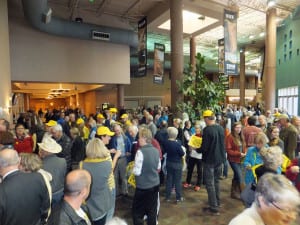
An overflow crowd showed up to the hearing in part because local conservation groups such as the Southern Utah Wilderness Alliance issued an “All Hands on Deck: Stop the Red Cliffs Highway!” call to members. Although the hearing wasn’t scheduled to start until 10 a.m., volunteers from SUWA wearing yellow hats, T-shirts, and buttons were on hand by 8 a.m. to pass out signs to sympathetic members. Opponents of the BLM who want more local and state control over land also made an effort to establish a presence at the hearing, but a brief survey of the crowd seemed to indicate they were outnumbered in the crowd waiting for the meeting.
People waited outside the doors for two hours before being allowed to enter. They packed every seat and spots in the aisles, with the crowd still spilling out into the hallway. Washington County Sheriff Cory Pulsipher ordered the center aisle to be cleared before the meeting started to meet fire regulations.
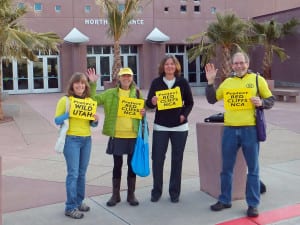
When subcommittee chairman Tom McClintock from California started the meeting, the crowd was ready to demonstrate their pent-up feelings even though this hearing was not a public forum. With the first four rows in the audience had been reserved by the Republican-dominated subcommittee, a clear division could be heard between the supporters of a Northern Corridor who filled the reserved seats in front and the opposition from a large portion of the rest of the room.
Among the guests of the subcommittee in front rows were prominent opponents of federal authority such as Iron County Commissioner David Miller, who helped to organize the Western Freedom Festival which has come under scrutiny for its use of $20,000 in public funds to help pay for it, and San Juan County Commissioner Phil Lyman, who was convicted of federal misdemeanor counts of conspiracy and driving motorized vehicles through public lands closed to vehicle use.
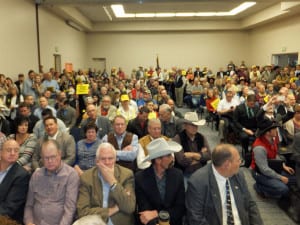
As the first item of business, Chairman McClintock invited the entire room to hold up signs and “make as much noise as they liked” for about a minute and then ordered all signs to be lowered and silence to be maintained for the rest of the meeting. The order had to be repeated several times with McClintock banging his gavel before the crowd complied, but for the rest of the meeting, the crowd maintained a respectful silence. At the end, McClintock praised the audience for their civil behavior.
During the testimony of witnesses, St. George Mayor Jon Pike and Washington County Commission Chairman Alan Gardner expressed their dissatisfaction with the BLM and the draft resource management plans, saying they had been excluded from the BLM planning process and that the draft report did nothing to answer their concerns. Pike accused the BLM of going back on their word and violating the law, which he said required the BLM to include St. George in the planning process. Gardner said that the county is considering legal action depending on the final form of the BLM report. Utah Congressman Rob Bishop, who is Chairman of the House Natural Resources committee, has been working with St. George and Washington County officials to change the draft report. At the hearing, Bishop urged Jenna Whitlock, Acting State Director of the BLM, to start over on the draft report and do it right the second time.
The official testimony presented in the morning session was heavily weighted against the BLM with Congressman Alan Lowenthal of California representing the only Democrat on the panel. Of the five witnesses, former Utah Attorney General and former executive director of Citizens for Dixie’s Future Paul Van Dam was the only invited witness who supported the BLM. The BLM was represented by Acting State Director Jenna Whitlock. Even though they are not on the Natural Resources Committee, Rep. Chris Stewart of Washington County and Rep. Jason Chaffetz were both on hand alongside Chairman of the Natural Resources Committee, Rob Bishop, to question witnesses. Subcommittee members Cresent Hardy of Nevada and Bruce Westerman of Arkansas also questioned the witnesses.
After a withering opening statement by Chairman McClintock — in which he reminded Whitlock that in the traditional story of Saint George versus the dragon, Saint George won — Whitlock came under unrelenting questioning from all of the Republicans on the committee. Democrat Lowenthal defended the BLM, pointing out that Utah’s own Sen. Bennett said during a Senate hearing in 2008 that, “Congressman Matheson and I have made significant changes to the previous proposal. We have permanently protected large amounts of biologically significant public land in Washington County, including additional wilderness and a new national conservation area. We have removed the corridor designations for the Lake Powell Pipeline Corridor and the Northern Corridor that bisected the Red Cliffs Desert Reserve.” The emphasis was added by Lowenthal when he quoted Bennett during the meeting.
The mood of the crowd as they left the meeting was somber since so little opportunity had been available to present the point of view of the opponents of the Northern Corridor highway. Commenting on the meeting, former Zion Park Superintendent Jock Whitworth said, “We got whipped today.”
Following the morning hearing, Rep. Stewart hosted a “Listening Session” in the afternoon with speakers chosen by invitation only. The topics ranged far beyond the Northern Corridor controversy, with the official list including the following hot button issues:
— BLM law enforcement.
— Federal agency actions against ranchers.
— Potential collusion between federal agencies and environmental groups.
— Introduction of the Mexican wolf.
— Monument designations.
Corridor opponent Lisa Rutherford told the Independent that the afternoon session did not even attempt to be equitable and that the testimony was “anti-BLM, anti-forest-service and just anti-feds generally.”
“Kane County state representative Mike Noel did his best to rile up the crowd,” Rutherford said, “and then at the end of the event grabbed the microphone to explain he’s not really calling for bloodshed.”


